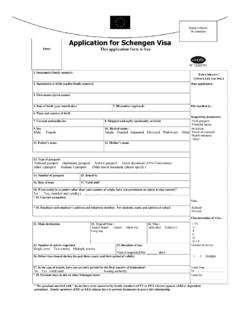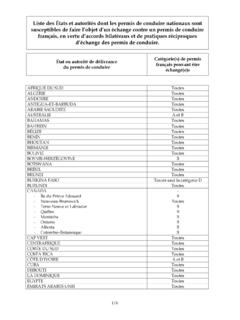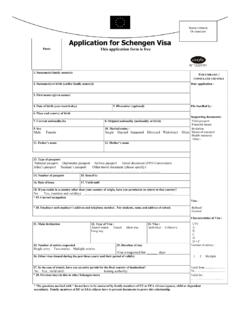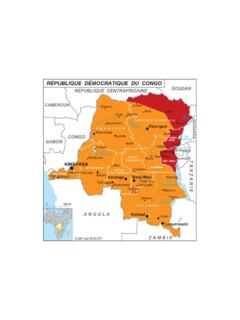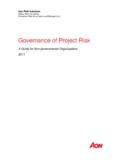Transcription of GOVERNANCE STRATEGY - France Diplomatie - MEAE
1 GOVERNANCESTRATEGYFOR FRENCH DEVELOPMENT ASSISTANCEM inist re des Affaires trang res DGCID/ DPDEV Sous-direction de la gouvernance d mocratique 20, rue Monsieur 75007 Paris STRATEGY approved by the CICID (Interministerial Committee on Interna-tional Cooperation and Development), 5 december 2006 Edition 2007 MAE2 SommaryGovernance STRATEGY .. 3I. Cooperation priorities1. Action to re-legitimise the State .. 82. Promoting the territorial reorganization .. 11 and the emergence of local actors 3. Promoting effective and transparent public action .. 124. Capacity strengthening .. 155. Contributing to international GOVERNANCE debates .. 16 II. A renewed approach, differentiated for each country1. GOVERNANCE and sector policies.
2 182. Different issues for different areas .. 183. New partners .. 194. Instruments .. 21 AnnexsAnnex 1 Results in the main areas .. 24 of cooperation on governanceAnnex 2 Partnership Framework Documents - DCPs .. 28 to improve oversight of development assistanceAnnex 3 Examples of the integration of democratic GOVERNANCE .. 29 into sector policies Annex 4 C2D .. 343 GOVERNANCE has been at the heart of development for almost fifteen years now. The concern became particularly apparent after the failure of the first generation of struc-tural adjustment plans, which demonstrated how important institutions and their environment are for economic reform (policies). Since then, attention has been focused on good GOVERNANCE as an instrument for achieving reform, and more particularly, economic reform, while maintai-ning political stability.
3 This approach later shifted to a broader understanding of the term. It is now recognized that not only the content of the policies themselves are important but also the way policies are drafted and implemented, notably with the participation of the shift can be seen among bilateral donors, and at the level of the European Union, as well as among multilateral institutions. For example, bilateral agencies have broadened their concerns to encompass a democratic agenda promoting a sound internal political base as a prere-quisite for more successful development programmes. These agencies place great emphasis on GOVERNANCE issues, as can be seen in the latest white paper by on poverty and GOVERNANCE Britain s DFID, or the discussions under way on GOVERNANCE strategies in other European countries.
4 Many donors disputed the role of the State for years, but now all of them insist on the need to strengthen the State so that it can play its full European Commission is engaged in a process which aims to define a harmonized European concept of democratic GOVERNANCE . The Commission s 2006 STRATEGY sees GOVERNANCE as a process from which flows a broad and holistic definition of democratic GOVERNANCE . In this approach dialogue and partnership, legitimacy, human and institutional capacity strengthening, are core issues. Morevover, a provision for a financial incentive tranch linked to GOVERNANCE is envisaged as a lever for aid and a tool to deepen dialogue with the ACP countries. The need for a case-by-case approach is also emphasized.
5 Since 1997 the UNDP in developing its concept of democratic GOVERNANCE has been engaged in an innovative new direction which emphasises human development. The World Bank, in its 2006 paper on strengthening Bank Group enga-gement on GOVERNANCE and Anti-corruption , recognizes a widened definition of good gover-nance, but highlights almost exclusively issues of corruption and make it a condition for aid increases/decreases or s approach to GOVERNANCE looks beyond the issues of institutions and forms of government. It also encompasses the social coordination mechanisms that contribute 4to political action. It looks at the decision-making process in all political and social bodies (States, businesses, local communities, non-governmental organizations, etc.)
6 And at all levels of government, from local to global. It looks at the drafting and decision-making process as much as at the decisions per se. Designing and implementing this approach requires the support and participation of all the stakeholders. France s approach to GOVERNANCE focuses on the process of , the definition of GOVERNANCE used in this STRATEGY is as follows: Art of governing, articulating the management of public affairs at various levels of terri-tories, regulating relationships within society and coordinating the interaction of the various actors. This means that GOVERNANCE is not a set of rules or an activity; it is a process. The task is not simply a matter of providing assistance to reform the State; it is also a matter of helping a society to rethink its own management procedures and define a GOVERNANCE model that best suits the challenges that it faces.
7 It is also a matter of giving the concept of ownership, which is at the heart of development policies, its full use of this approach and the resulting definition of GOVERNANCE implies a shift in our cooperation policy. In 1990, France embarked on a democratic conditionality doctrine (La Baule Declaration) that grew into a dialogue and partnership policy aimed at promoting the strengthe-ning of rule of law, democracy and human rights. good GOVERNANCE and development was the official theme of the 1996 France -Africa summit. In this regard, France s cooperation policy developed primarily in the institutional field. It focused on the traditional sectors of public affairs management, which still correspond to our partners needs (see Table in Annex I), but now need to be broadened to meet the many chal-lenges of development.
8 Thus, France is now promoting the concept of democratic GOVERNANCE . This is built on several principles, which must give due consideration to the complexity of the issues if they are to contribute to sustainable human development: GOVERNANCE concerns all dimensions: territoral (from local to global), the economy (public-sector, private-sector or a combination of the two), society (expression of users needs through their participation), the environment, politics and culture. It therefore encompasses security issues as well. For a long time, development and security seemed to be two totally separate domains, but it has now been established that insecurity is linked to poverty and that there is a chain of cumulative inequalities, conflicts and crises.
9 5 Therefore, GOVERNANCE involves both capacity-strengthening (human and institutional capaci-ties) and interactions between various strands (social, economic, political, administrative, etc.), the various stakeholders (State, population groups, private sector, etc.) and various levels (local, national, regional, global). It makes it possible to address cooperation issues as cross-cutting approaches (particularly in sector policies) and as specific areas for action. GOVERNANCE is a process. Accordingly a turnkey democratic development model becomes contradictory if it means that local choices are pre-empted. Such approach could widen the gap between legality and legitimacy. Therefore, the task before us is to promote the emer-gence and maturing of democratic GOVERNANCE procedures that are specific to each society and that comply with the universal and fundamental values of the democratic ideal that are recognized by international conventions and agreements.
10 This means that the quality of cooperation should not be measured so much by its ability to lay down universal standards manipulated in the abstract through conditionality as it should be assessed by its ability to provide each partner with specific experience and expertise to enable them to develop their own policies. This approach highlights the importance of the human factor by reaffirming the core role of the individual in development policies, both as a development beneficiary and as a deve-lopment player. It raises the question of how a society is organized to ensure equality (of opportunity) and equity (social and economic justice) for all citizens. Poverty has many dimensions. GOVERNANCE policies fit into this context to ensure more effective participation by the population and to improve the effectiveness of poverty reduction strategies to enhance their contribution to achieving the Millennium Development Goals.
